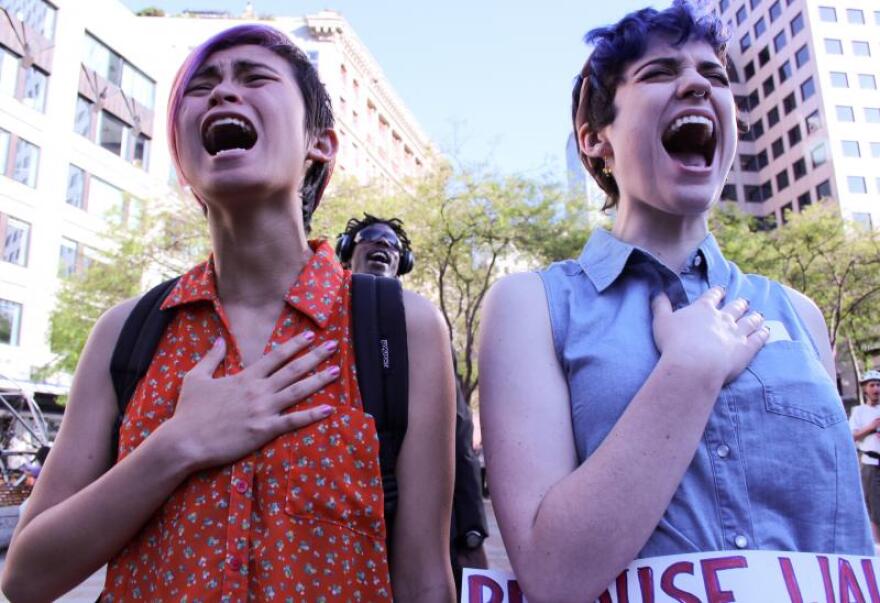Women didn’t plan for 2014 to be a year of activism. But a series of events sparked a discussion of sexual assault on campus, rape and incessant harassment of young women in public.
On social media, a movement materialized under the hashtags #yesallwomen and #carrythatweight.
"Carry that weight" referred Emma Sulkowicz, the Columbia University student who carries a mattress around campus, demanding that her alleged rapist be kicked out of school. (The university has dismissed the case made by Sulkowicz and two other women.)
Read: A Six-Second Scream For #YesAllWomen
Read: Jezebel’s Lindy West On The Meaning Behind #Yesallwomen
In Seattle, hundreds of women gathered at Westlake Center for a six-second scream. Alia Kusumaningrat, 18, said the event was literally about finding her voice.
“We don’t have the tools to talk about this, you know, words,” Kusumaningrat said. “It’s hard to articulate these feelings because I don’t have the words."
In the press, survivors of assault are rarely named, but more women found the words to tell their stories using their names.
In a powerful interview for The Record, Marcie Sillman interviewed Jennifer Hopper, whose partner was killed while protecting her at their South Seattle home.
A woman named Barbara Bowman wrote an essay in the Washington Post that Bill Cosby raped her. After her story was published, more than a dozen women have said he also hurt them. As the Cosby story unfolded, Jian Ghomeshi, the Canadian talk show host, was outed by women who said he assaulted them.
Lindy West, a former writer at Jezebel who lives in Seattle, launched the enormously popular Tumblr, I Believe You It’s Not Your Fault. She was inundated with essay submissions by women who had been abused. The idea for the project came out of a discussion on an underground women’s writers group that formed this year and now has 30,000 members.
Read: Asking Bill Cosby If He’s A Serial Rapist
Read: Jennifer Hopper Reclaims Her Identity, Love, Honesty
These stories were told and retold -- as vignettes on Twitter but also in private conversations between friends, sisters, mothers and daughters. We told our partners and our coworkers.
Other issues about women also resonated. At KUOW, we were surprised when a post about lactation rooms went viral. It was a simple post with a slideshow of our listeners' lactation rooms -- some idyllic, others a shower stall. When we looked at our website statistics, we saw that our readers were hungry for stories about women.
(We should add that KUOW’s lactation room is now much improved.)
Read: SLIDESHOW: Lactation Rooms Around Seattle And Beyond
Read: Labor Intensive (stories about C-sections in Washington state)
[asset-images[{"caption": "Doctors at Swedish Hospital in Seattle submitted images of a shower stall they have converted into a lactation room. The photo was part of a slideshow of lactation rooms. ", "fid": "111288", "style": "offset_right", "uri": "public://201412/lactation-room.jpg", "attribution": "Credit Submitted Photo"}]]We partnered with the Northwest News Network for stories about the sky-high C-section rate in Washington state.
And in a series about East Indians in the Seattle area, Liz Jones wrote about the wives of the tech industry whose visas do not allow them to work here in the states.
Read: Visas Put Careers On Hold For Tech Wives
Upasana Kone, whose husband works at Microsoft, told Liz, “It hurts your self-esteem, your independence. It kind of kills your confidence slowly and surely."
Liz also reported on the pay gap between men and women in Seattle. City employees earn on average 9.5 percent less than men. The wage gap persists in private businesses, too, Councilmember Jean Godden learned.
“To find out that we are the worst in the U.S. of any metropolitan area – that was a shock,” Godden said.
Read: Seattle Women Earn Less And The City Wants That To Change

